Paper
For submission of articles or Working Papers to CEsA, please send an email to:
comunicacao@cesa.iseg.ulisboa.pt

O Recente Cenário Literário de Maputo: Notas de Campo
Abstract:
Using the ethnographic tool of the “Field Diary”, resulting from participant observation and photographic recordings carried out in Maputo, between September and October 2022, the main objective of the text is to articulate the current literary scenario of the city with its geography, analyzing permanencies and transformations that are established in the constant dispute between memory and oblivion.
Quotation:
Gallo, F. (2023). “O Recente Cenário Literário de Maputo: Notas de Campo”, In: A narrativa moçambicana no século XXI. Caderno Seminal Digital (n.º 45). Dialogarts. DOI http://dx.doi.org/10.12957/seminal.2023.79835

Modelos de Construção do Romance Africano em Nyembête ou As Cores da Lágrima
Abstract:
This study is based on Calane da Silva’s proposal, as an essayist, on the writing of the new African novel for the 21th century, which in my view still needs debate, but which can already be analyzed from the author’s own proposal, in his novel Nyembête ou as cores da lágrima. I demonstrate, with this research, the characteristics that allow us to accept the work as a formation novel, a designation that I borrow from Puga (2016). I argue that it is a narrative with neo-romantic elements, namely polyphony and death with the possibility of return, factually found in the Traditional Bantu Culture and in the Apostolic Catholic Tradition, and I also consider its perspective of a self-fictional novel (Faedrich, 2015), bearer of biographical marks of its author. In developing this research, I do so in the knowledge that it is a different conception of writing than what is usual to find in Calane da Silva – prose writer and short story writer (because he was also a poet). Added to this, in this article I observe that the author takes an approach to spirituality, centered on his studies on Spiritual Anthropology.
Quotation:
Laisse, S. J. (2023). “Modelos de Construção do Romance Africano em Nyembête ou as Cores da Lágrima”, In: A narrativa moçambicana no século XXI. Caderno Seminal Digital (n.º 45). Dialogarts. DOI http://dx.doi.org/10.12957/seminal.2023.79833

Subversão do Romance Policial e Questões de Memória em A Ilha dos Mulatos
Abstract:
This article presents a study about A Ilha dos Mulatos (2020), by Sérgio Raimundo, based on the structure of the detective novel, which is subverted and expanded to the level of narration, creating a game of masks in order to uncover the narrative voices. It deals with the theories of memory and the way memory is treated in the novel, unfolding in the notion of post-memory. Articulating memory as one of the necessary elements for the discovery of the guilty in the framework of the crime novel, we verify that it also turns out to be subverted in the writing of this novel.
Quotation:
Jeremias, R. & Leite, A. M. (2023). “Subversão do Romance Policial e Questões de Memória em A Ilha dos Mulatos”, In: A narrativa moçambicana no século XXI. Caderno Seminal Digital (n.º 45). Dialogarts. DOI http://dx.doi.org/10.12957/seminal.2023.79829
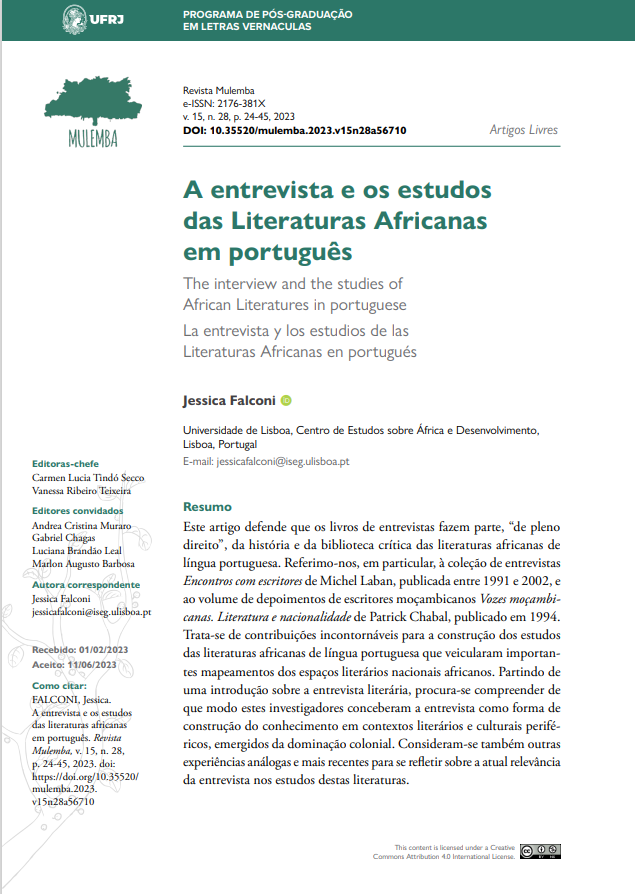
A Entrevista e os Estudos das Literaturas Africanas em Português
Abstract:
This article argues that interview books are a “full right” part of the history and critical library of Portuguese-language African literature. We refer, in particular, to the collection of interviews “Encontros com Escritores” by Michel Laban, published between 1991 and 2002, and the volume of testimonies by Mozambican writers “Vozes Mozambicanas. Literature and nationality by Patrick Chabal”, published in 1994. These are unavoidable contributions to the construction of studies of Portuguese-language African literatures that conveyed important mappings of African national literary spaces. Starting from an introduction to the literary interview, we seek to understand how these researchers conceived the interview as a way of building knowledge in peripheral literary and cultural contexts, emerging from colonial domination. Other similar and more recent experiences are also considered to reflect on the current relevance of interviews in studies of these literatures.
Quotation:
FALCONI, J. A entrevista e os estudos das literaturas africanas em português. Revista Mulemba, v. 15, n. 28, p. 24-45, 2023. doi: https://doi.org/10.35520/mulemba.2023.v15n28a56710
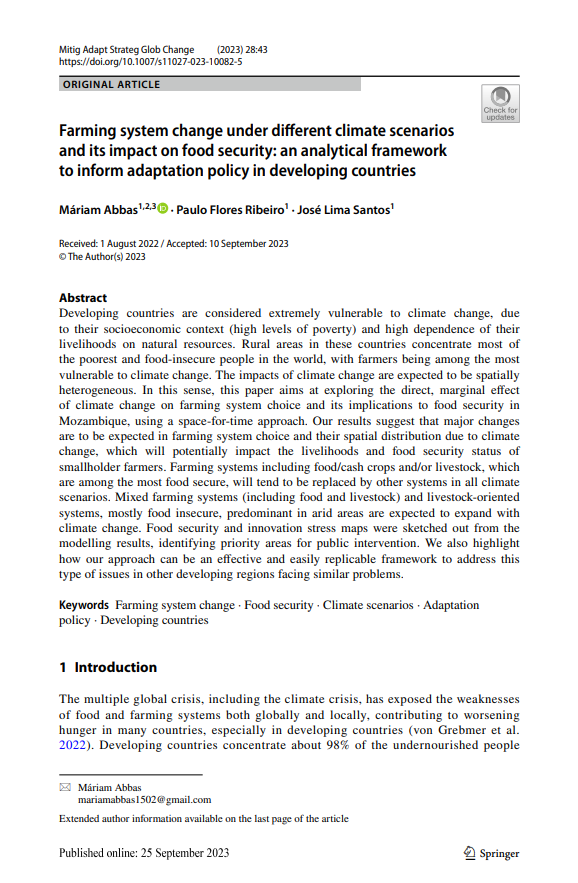
Farming System Change Under Different Climate Scenarios and its Impact on Food Security: an analytical framework to inform adaptation policy in developing countries
Abstract:
Developing countries are considered extremely vulnerable to climate change, due to their socioeconomic context (high levels of poverty) and high dependence of their livelihoods on natural resources. Rural areas in these countries concentrate most of the poorest and food-insecure people in the world, with farmers being among the most vulnerable to climate change. The impacts of climate change are expected to be spatially heterogeneous. In this sense, this paper aims at exploring the direct, marginal effect of climate change on farming system choice and its implications to food security in Mozambique, using a space-for-time approach. Our results suggest that major changes are to be expected in farming system choice and their spatial distribution due to climate change, which will potentially impact the livelihoods and food security status of smallholder farmers. Farming systems including food/cash crops and/or livestock, which are among the most food secure, will tend to be replaced by other systems in all climate scenarios. Mixed farming systems (including food and livestock) and livestock-oriented systems, mostly food insecure, predominant in arid areas are expected to expand with climate change. Food security and innovation stress maps were sketched out from the modelling results, identifying priority areas for public intervention. We also highlight how our approach can be an effective and easily replicable framework to address this type of issues in other developing regions facing similar problems.
Quotation:
Abbas, M., Ribeiro, P.F. & Santos, J.L. Farming System Change Under Different Climate Scenarios and its Impact on Food Security: an analytical framework to inform adaptation policy in developing countries. Mitig Adapt Strateg Glob Change 28, 43 (2023). https://doi.org/10.1007/s11027-023-10082-5
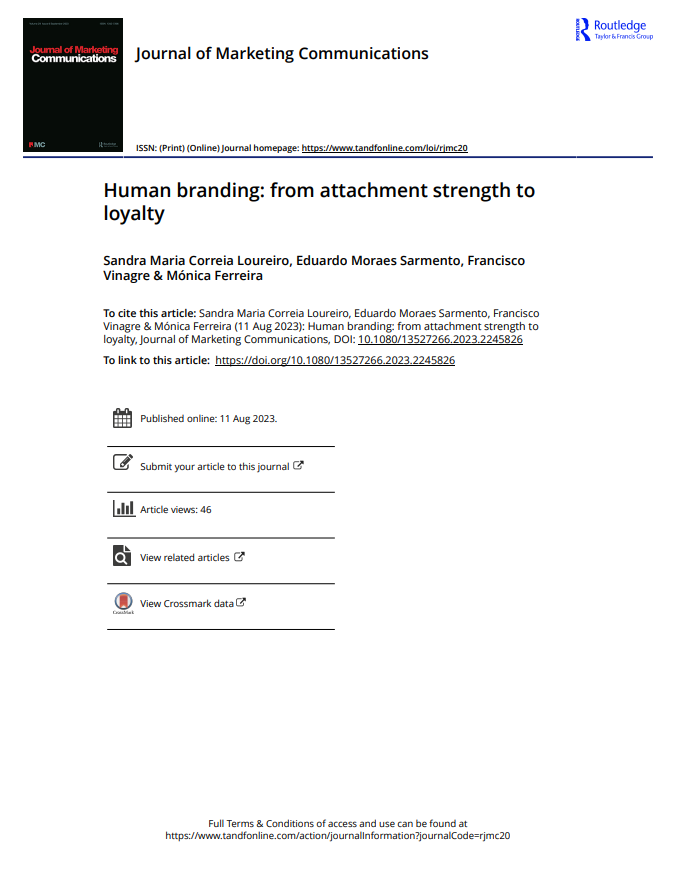
Human Branding: From attachment strength to loyalty
Abstract:
Human branding is everywhere and within every individual. With the increase in the importance of technology and social media, human branding becomes increasingly relevant, but it is still a branding concept with much room to explore. Celebrities, such as actors and athletes, are the greatest examples of human brands, and with social media managing public image is key to success. This study aims to analyze the process by which attachment strength influences loyalty through intimate and public engagement. Thus, a sample of 321 participants, collected through social media platforms, allowed us to treat data and test the hypotheses of the proposed model. Relatedness is the most relevant driver of attachment strength and the flow from attachment to loyalty through public engagement.
Quotation:
Loureiro, Sandra Maria Correia … [et al.] (2023) “Human Branding: From attachment strength to loyalty”. Journal of Marketing Communications, DOI: 10.1080/13527266.2023.2245826
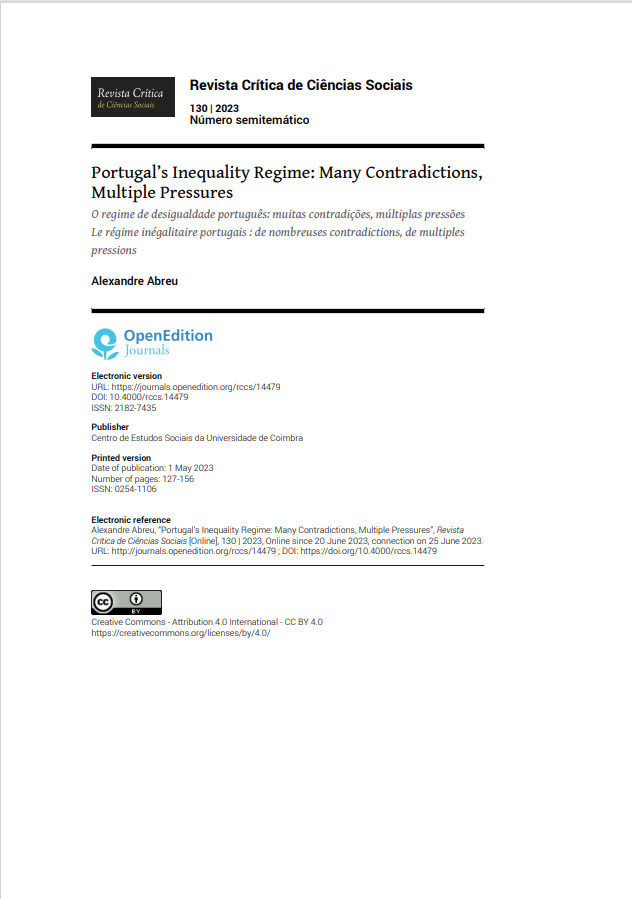
Portugal’s Inequality Regime: Many contradictions, multiple pressures
Abstract:
This paper applies the concept of inequality regime, in the tradition of the Regulation School, to the analysis of the patterns and drivers of socioeconomic inequality in Portugal in the last few decades. Key empirical patterns are identified with respect to income inequality, top and bottom incomes, wealth inequality, monetary poverty and non-commodified provision of basic goods. We then discuss several underlying processes and mechanisms, namely the capital-labour relation, classification struggles, financialisation, redistribution, and welfare, to account for the identified empirical patterns. We conclude that Portugal’s inequality regime is remarkably contradictory and argue that the country’s success in curbing most measures of inequality in recent times is especially vulnerable to a variety of pressures.
Quotation:
Abreu, A. (2023). “Portugal’s Inequality Regime: Many contradictions, multiple pressures”. Revista Crítica de Ciências Sociais, 130:127-156
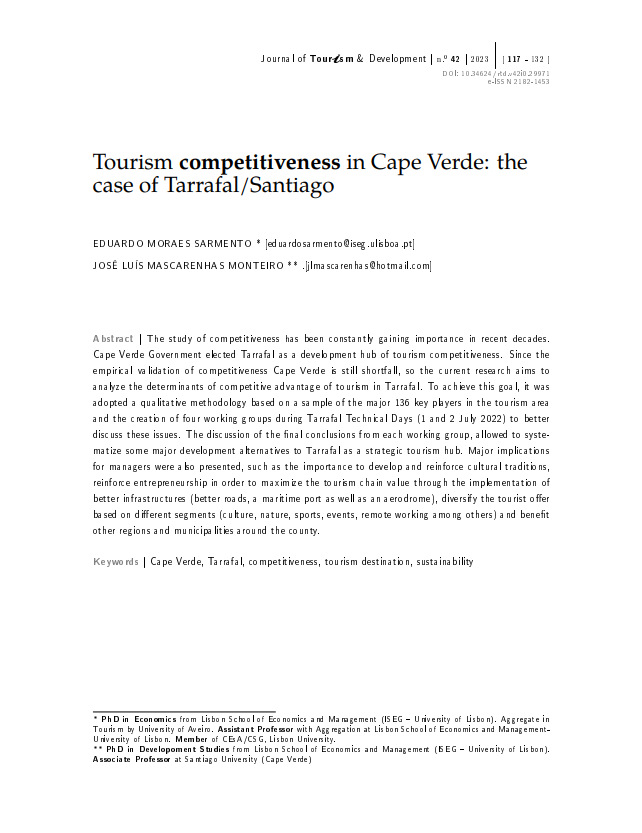
Tourism Competitiveness in Cape Verde: The case of Tarrafal/Santiago
Abstract:
The study of competitiveness has been constantly gaining importance in recent decades. Cape Verde Government elected Tarrafal as a development hub of tourism competitiveness. Since the empirical validation of competitiveness Cape Verde is still shortfall, so the current research aims to analyze the determinants of competitive advantage of tourism in Tarrafal. To achieve this goal, it was adopted a qualitative methodology based on a sample of the major 136 key players in the tourism area and the creation of four working groups during Tarrafal Technical Days (1 and 2 July 2022) to better discuss these issues. The discussion of the nal conclusions from each working group, allowed to systematize some major development alternatives to Tarrafal as a strategic tourism hub. Major implications for managers were also presented, such as the importance to develop and reinforce cultural traditions, reinforce entrepreneurship in order to maximize the tourism chain value through the implementation of better infrastructures (better roads, a maritime port as well as an aerodrome), diversify the tourist o er based on di erent segments (culture, nature, sports, events, remote working among others) and bene t other regions and municipalities around the county.
Quotation:
Sarmento, Eduardo Moraes e José Luís Mascarenhas Monteiro (2023). ” Tourism competitiveness in Cape Verde : the case of Tarrafal/Santiago”. Revista Turismo & Desenvolvimento, 42:117-132
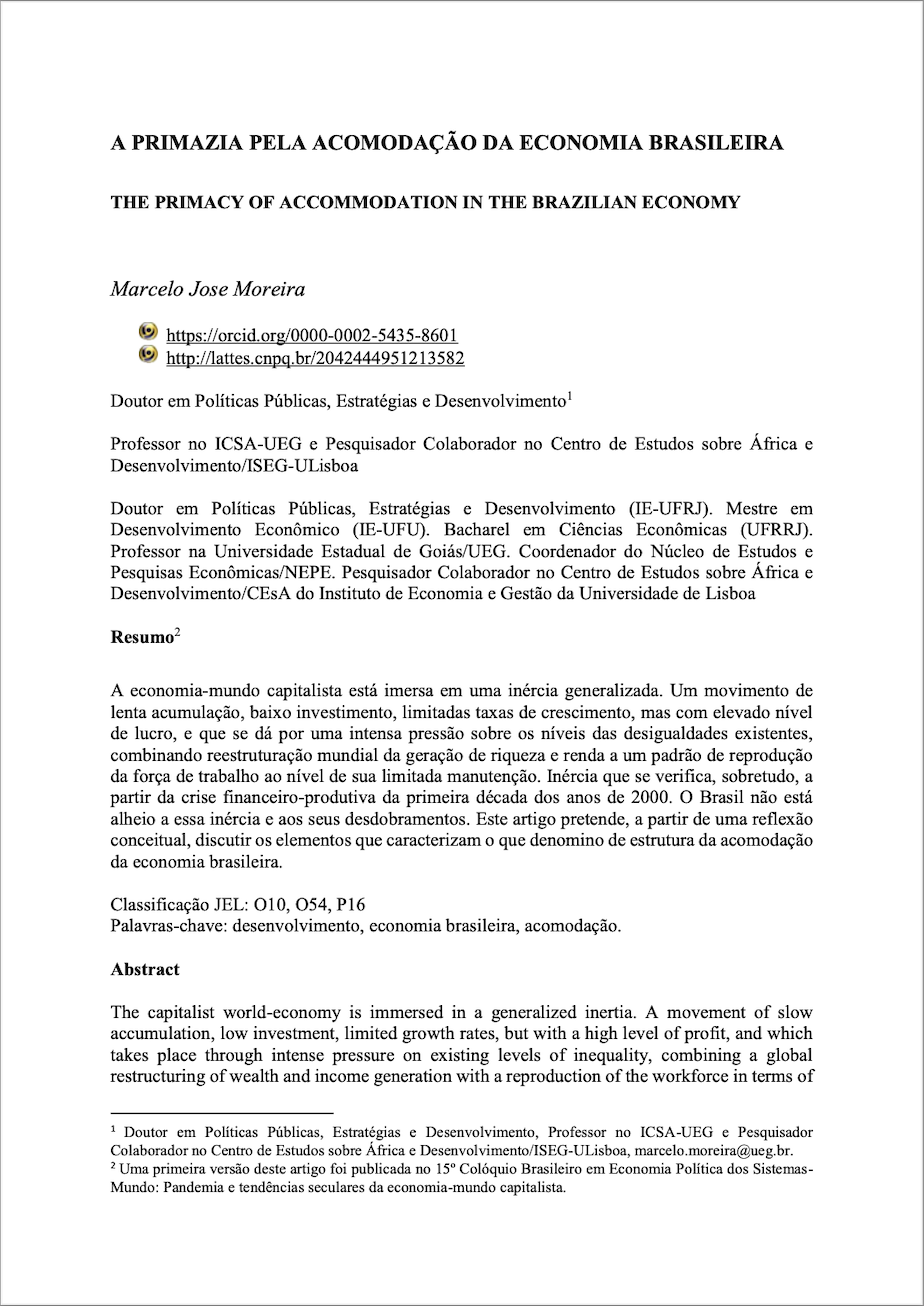
The primacy of accommodation in the Brazilian economy
Abstract:
The capitalist world-economy is immersed in a generalized inertia. A movement of slow accumulation, low investment, limited growth rates, but with a high level of profit, and which takes place through intense pressure on existing levels of inequality, combining a global restructuring of wealth and income generation with a reproduction of the workforce in terms of its limited maintenance. Inertia that can be seen, mainly, from the productive-financial crisis of the first decade of the 2000s. Brazil is not oblivious to this inertia and its consequences. This article intends, from a conceptual reflection, to discuss the elements that characterize what I call the accommodation structure of the Brazilian economy.
Quotation:
Moreira, Marcelo José (2021). “A primazia pela acomodação da economia brasileira”. Revista de Economia da UEG. 17(2), p. 44-65
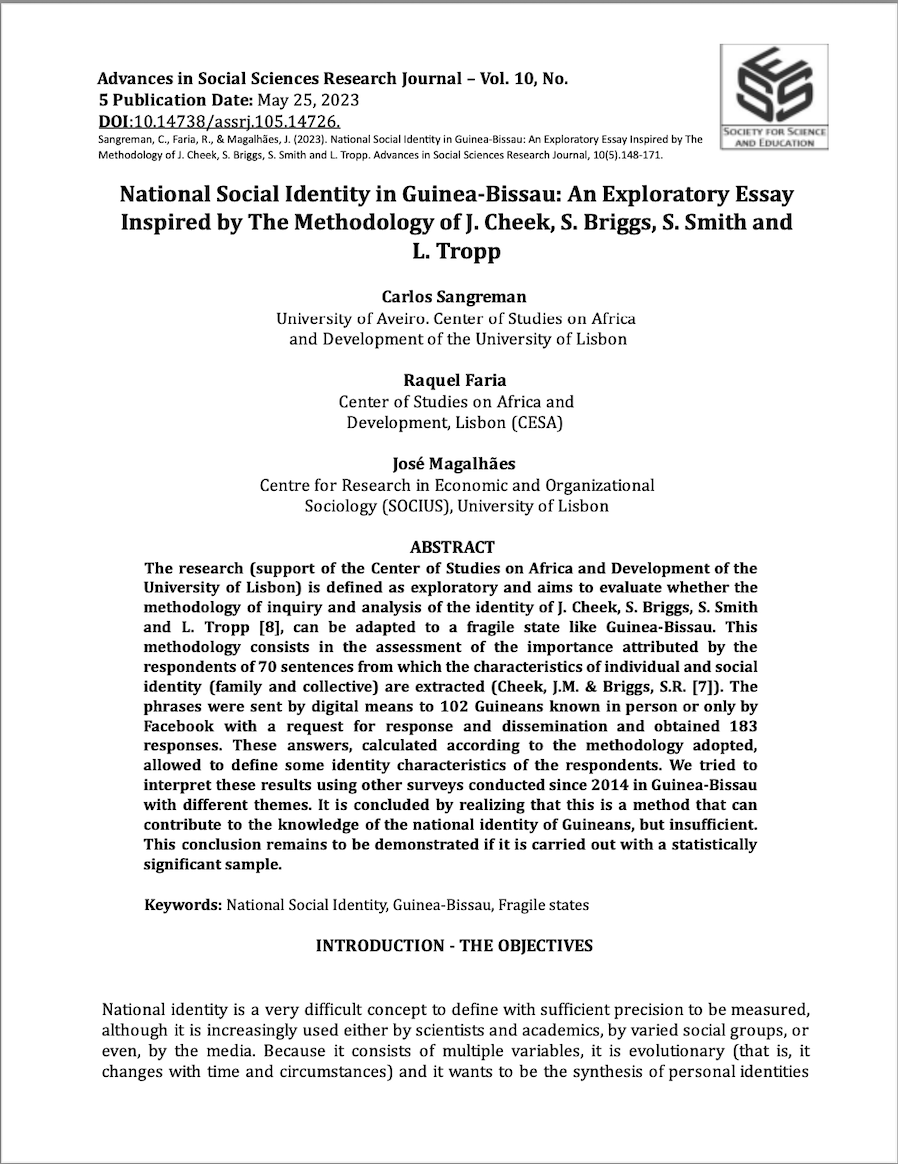
National Social Identity in Guinea-Bissau: An Exploratory Essay Inspired by the Methodology of J. Cheek, S. Briggs, S. Smith and L. Tropp
Abstract:
The research (supported by the Centre for African and Development Studies of the University of Lisbon) is defined as exploratory and aims to evaluate whether the methodology of inquiry and analysis of the identity of J. Cheek, S. Briggs, S. Smith and L. Tropp, can be adapted to a fragile state like Guinea-Bissau. This methodology consists in the assessment of the importance attributed by the respondents of 70 sentences from which the characteristics of individual and social identity (family and collective) are extracted (Cheek, J. M. & Briggs, S. R.). The phrases were sent by digital means to 102 Guineans known in person or only by Facebook with a request for response and dissemination and obtained 183 responses. These answers, calculated according to the methodology adopted, allowed to define some identity characteristics of the respondents. We tried to interpret these results using other surveys conducted since 2014 in Guinea-Bissau with different themes. It is concluded by realizing that this is a method that can contribute to the knowledge of the national identity of Guineans, but insufficient. This conclusion remains to be demonstrated if it is carried out with a statistically significant sample.
Quotation:
Sangreman, C., Faria, R., & Magalhães, J. (2023). National Social Identity in Guinea-Bissau: An exploratory essay inspired by the methodology of J. Cheek, S. Smith and L. Tropp. Advances in Social Sciences Research Journal, 10(5).148-171.





